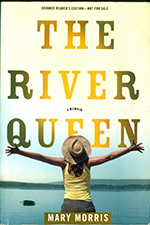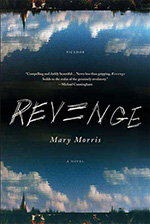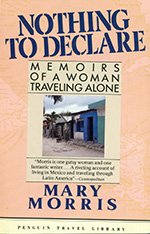
When bison roamed the Great Plains, the cowbird followed them. It lived off the insects on the buffalos' backs so as the buffalo traveled, so did the cowbird. Because of its itinerant existence, the cowbird made an interesting adaptation. It laid its eggs in the nests of other birds. Then moved on, leaving its fledglings to be hatched and raised by the hosts. The cowbird never saw its young.
Years ago I was a kind of drifter too. Within reason I went where I wanted. I stayed as long as I could. My father once mailed letters to me care of every US embassy in Central America. My favorite letter contained a newspaper clipping of an automobile accident. My father wrote, "This is your friend, Linda's car, which flipped over six times on the highway. Thank God she was wearing her seat belt. Hope you are safe too."
Back in the States a friend who knew my wandering ways admonished me. "Don't have children. Your life will never be your own again."
And then all my free-floating came to an end. I had a child. I was sailing down the Yangtzee River when I conceived my daughter. I was on a journey that was taking me around the world through China, to the TransSiberian railroad, through Mongolia, Siberia, the then Soviet Union, on to Poland, Germany where I flew home from Berlin. By the time I reached Moscow, I was sick and tired. In Leningrad I roamed the canals during White Nights like some mad Dostoyevskian character. A young female Russian doctor who befriended me confirmed what I already knew. "You're pregnant," she told me. She brought me oranges - small, brown and hard - as I was heading off to Poland. "You will need your strength," she said.
During my pregnancy, I nested. I built bookshelves. I pierced my ears. My cousin assured me that I'd written my last book. While I was in labor, I turned to my nurse, "I used to be a travel writer." And the nurse replied, "Make her sleep in different places and she'll go anywhere with you."
So I did.
Of course I put Kate in her crib, but she also slept in my bed, in a dresser drawer, on the floor. I stuck her in her car seat and we drove around the California desert for the better part of a year. In some burnt-out desert town a man offered to buy her. "She's not for sale," I said. I had car trouble and asked at a house for help. The man there offered to let me spend the night. He had a double bed, attached to the roof of his house. "You can sleep under the stars." Kate went everywhere we went.
Where I'd once traveled alone, now I felt more like a moving caravan, gypsies, wending our way through the world. When I went to Cuba on assignment, Kate and Larry accompanied me. Her second teacher asked Kate to keep a journal of her time away. Unfortunately I was arrested at the airport in Havana, put under house arrest, and deported to Jamaica five days later.
In her journal Kate drew pictures and wrote captions which she shared with her class. "In Toronto we had a snowball fight." "In Valladara I bought a straw hat." "In Havana the police took my mother away." Still my child remained intrepid. A publisher wanted me to write a book about Africa. I asked Kate how she'd feel about living in Kenya for a year. She replied, "Fine, but I'd miss you." I had to explain to her that her father and I were in fact coming along.
At another moment in my life I would have seen myself as the hapless cowbird, drifting, unfettered, never looking back. But after Kate was born, I made sure that the pilot of whatever plane I was on had pictures of his grandchildren on the dashboard. I had never minded the dangers of the world; now I feared them, not for myself, but for her. I never understood before that you can love someone else more than you love yourself.
But it is true. There was a trade-off I made long ago. But there has also been enormous gains. After all even the cowbird, a bit of a menace really, has learned to adapt yet again. The buffalo no longer roam. So that cowbird tends to sit on the backs of grazing cattle and sheep. Its journeys don't take it so far either. I will travel again and I will go far away.
Soon perhaps.
But I will always remember that moment in Jamaica to where the Cubans shipped us. We checked into a hotel to recover from our ordeal and I took Kate down to the sea. There was a coral reef right off the beach and I showed her how to use snorkel and mask. Putting her face into the water, she kicked around. Then look back up at me. "It's a wonderful world," she said.























